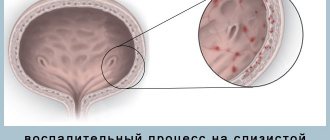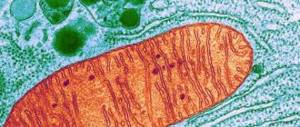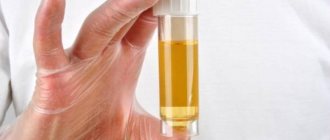Burning sensation as the first sign of bladder inflammation
Damage to the bladder mucosa by pathogenic microorganisms leads to changes in the texture of the surface tissues. This process is accompanied by the spread of bacteria throughout the mucous membrane and even their penetration into the urinary canal. The movement of urine along the inflamed epithelium leads to itching and burning. The salts that form the basis of the liquid irritate the altered tissues, causing pain.
It happens that this symptom occurs even before problems occur during urination, and allows one to suspect the presence of problems. What to do in this case? Immediately go to the doctor, take the necessary tests and begin specialized treatment. Some women believe that at an early stage of the disease, taking herbal medicines, physiotherapy and using folk remedies may be enough.
Remember: In fact, even the first signs of cystitis indicate that the development of the pathology is in full swing, so treatment will require comprehensive and aggressive treatment.
Why the disease occurs and symptoms
- Failure to comply with personal hygiene rules.
- Intentional retention of urination, which may occur when a person is currently unable to visit the toilet.
- Hormonal changes in the body.
- Surgical intervention on the pelvic organs.
- Hypothermia of the body, especially the pelvic area and legs.
- Eating foods that can irritate the tissues of the urethra and bladder.
- Pregnancy period.
- Taking a course of radiation therapy for the treatment of malignant tumors in the pelvic area.
- discomfort, pain and burning in the perineum during urination;
- increased urination;
- change in urine color to red;
- itching in the vagina.
If the disease is of a bacteriological nature, then the analysis will identify pathological microorganisms.
Features of itching with cystitis
In women and men, inflammatory damage to the bladder can occur differently. Even the presence of itching and burning can indicate specific moments accompanying the condition. In any case, it is strictly forbidden to fight these symptoms on your own. Especially with the help of thermal procedures and painkillers. Untimely use of the former can aggravate the situation, and the use of the latter does not give the desired effect, only smoothing out the brightness of clinical manifestations.
Clinical picture in girls
In women, the microbes that provoke the disease most often enter the hollow organ through an ascending route, which increases the likelihood of severe itching and burning. The symptom is rarely permanent, most often it occurs at the beginning and end of urination, during sexual intercourse or immediately after it. The specificity of the situation is that in women cystitis rarely occurs in isolation. Most often, acute manifestations indicate that other inflammatory processes are present in the body.
Before relieving the burning sensation of cystitis, you need to make sure your suspicions are correct. Severe itching, which intensifies under the influence of external factors, may indicate colpitis, candidiasis or vaginitis. In this case, a secretion with an unpleasant odor is released from the vagina, which is not typical for cystitis. The irritating manifestation in some cases turns out to be the body’s reaction to the use of intimate hygiene products. The use of antibiotics in this case can aggravate the situation and provoke complications.
Specifics of symptoms in men
In representatives of the stronger sex, the appearance of pain during bladder emptying is also not always a sign of cystitis, however, other types of infection occur even less frequently than inflammation of the organ. It is worth considering that in men, cystitis usually develops along a descending path, pathogens descend into the bladder from the kidneys or pass through a number of located organs. That is why it is so important to conduct all the necessary research, and not just start symptomatic therapy. Unlike women, itching and burning with cystitis in men are more often accompanied by fever, pain in the area above the pubis and general weakness.
Causes of discomfort
Itching of the genital organs occurs against the background of the proliferation of microbes that have begun their active life. They damage the mucous membrane of the bladder and provoke the release of other substances that cause irritation.
Itching with acute cystitis is a consequence of a violation of the microflora of the internal genital organs, which can lead to the development of dysbacteriosis.
Unpleasant sensations when going to the toilet indicate the presence of an infection in the urethra and bladder. This itching is periodic. Other factors may also be responsible for this phenomenon:
- Age-related changes in the body;
- Tight synthetic underwear;
- Various parasites;
- Taking antibiotics.
Representatives of the stronger sex are less likely to experience inflammation in the bladder, but they can also show clear symptoms of cystitis. In men, a burning sensation often occurs during and at the end of urination, accompanied by elevated body temperature, loss of strength and abdominal pain.
This condition is caused by stress, hypothermia, weakened immunity, and exposure to chemicals on the bladder.
Irritation in the groin area caused by urine can cause discomfort, since cystitis is often accompanied by urine incontinence. Itching and burning also occur with frequent visits to the toilet.
Another reason why a person experiences pain with cystitis can be bacteria in the bladder. Moreover, they often cause another disease in the patient - urethritis. When inflammation of the urethra reaches the external opening of the urethra, a person experiences burning and itching.
Symptoms of the disease depend on the form of cystitis. Often the cause of pathology and discomfort is fungi, in particular Candida.
Intense itching most often indicates the development of this microorganism. Moreover, in women it can be localized both in the urethra and in the vagina, causing painful and uncomfortable sensations.
Acute cystitis
The acute form of the disease is characterized by a frequent urge to urinate in small portions, accompanied by pain and burning. Patients experience pain in the groin and anus. The urine becomes cloudy and has an unpleasant odor.
Treatment of acute cystitis involves taking antibacterial and analgesic drugs in combination with local thermal effects, physiotherapy and treatment with folk remedies (decoctions, infusions).
Acute cystitis occurs as a result of the development of pathogenic microflora in the bladder. In most cases, it is caused by Escherichia coli, Proteus, enterococci and staphylococci.
Chronic cystitis is infectious in nature. It can be caused by bacteria entering the genitourinary system.
Also, the chronic form of cystitis is typical for patients with diseases of the genitourinary system or other pathology, which can lead to the development of infection in the body and the development of inflammation in the bladder.
A decrease in immunity can lead to a weakening of the protective properties of the mucous membrane of the bladder. The disease can become chronic if a person has previously been diagnosed with urethritis, pyelonephritis, vulvovaginitis, prostatitis, STDs, tonsillitis or caries.
The chronic type of disease can be asymptomatic. In this case, exacerbations occur rarely (once a year) or often (more than 2 times a year) in the form of a continuous, sluggish process. In rare cases, pain and frequent urges are present.
With a stable latent course of chronic cystitis, the patient has no complaints. Inflammation in the bladder can only be detected through endoscopic examination.
The main cause of burning is the proliferation of pathogens in the genitourinary system. If the disease is not treated, the number of bacteria in the bladder increases rapidly. Inflammation occurs, which provokes a feeling of itching and burning.
Patients with cystitis sometimes experience an acute burning sensation in the external genital area. This is explained by the fact that the pathology often provokes urinary incontinence. It is constantly released in small quantities and irritates the skin of the genitals due to its aggressive composition.
If women experience itching in the vagina, this may indicate diseases associated with cystitis: thrush, vaginitis, colpitis, vaginal dysbiosis. The presence of infections in a man’s body (thrush and sexually transmitted diseases) can also be accompanied by signs of itching and burning.
The intensity and localization of symptoms also depend on the form of cystitis.
Acute cystitis
Discomfort is more intense during the acute phase of cystitis. During this period, it appears in the urethra as a sign of inflammation of the latter. Severe itching and burning are felt during urination, since this is how pathogenic bacteria are washed out from the urethra or bladder. These same symptoms, localized in the vagina, are characteristic of the acute period of cystitis.
As a rule, inflammation of the genitourinary organs itself does not cause such symptoms, and itching with cystitis in women is a symptom of another pathology. In principle, the disease itself may be a consequence of a disease of the reproductive system, provoked by bacteria, fungi or infection, so the manifestation of such symptoms in the intimate area is quite understandable.
Itching after treatment of cystitis, or during therapy, may occur due to an imbalance of microflora caused by taking antibiotics and local medications. In this case, it will be accompanied by pathological vaginal discharge, as well as burning and other unpleasant sensations in the affected area.
Allergic reactions can also cause itching. If the symptom manifests itself during the emission of urine, and is accompanied by acute pain, stinging and burning, then this indicates that the organs of the genitourinary system are affected by infection. A feature that distinguishes the manifestation of the inflammatory process and fungal disease is periodicity.
Every person who feels such unpleasant symptoms is interested in whether itching occurs with cystitis in an intimate place and how to get rid of it. However, it is impossible to independently determine the cause of its manifestation, since it may be a signal of the development of another pathology. Thus, with cystitis, itching and burning in the intimate area appear periodically, mainly during urination, and are accompanied by severe pain and stinging.
However, if discomfort manifests itself constantly, it is worth thinking about the development of a gynecological disease, the cause of which may be fungi, bacteria or viruses. This problem can develop at different stages of the disease, and it is important not to miss the body’s “signal” and seek qualified medical help.
Often, patients, having consulted a doctor, are interested in how to relieve itching of the labia, confidently asserting that they have inflammation of the genitourinary system. However, a full medical examination leaves them in shock when it turns out that the diagnosis is not cystitis at all, but diabetes. Thus, this category of patients, taking medications without a specialist’s prescription, can seriously worsen their health, since most medications are strictly contraindicated for them. This situation is an example of those cases when patients begin to self-medicate without being convinced of the correct diagnosis.
Diet and drinking regimen as the best remedy for itching
Active consumption of liquids with medicinal properties in a short time relieves discomfort by washing away pathogens from the bladder and reducing the concentration of urine. Even if you drink ordinary water at room temperature, positive dynamics will soon manifest themselves. But it is still better to use special drinks for specific therapeutic purposes.
To reduce itching and burning, the following formulations are indicated:
- Decoction on cherry branches.
- A decoction of rose hips with the addition of juniper or rowan.
- Green tea. Be sure to be fresh, not very concentrated, without adding milk or sweeteners.
- Cranberry or lingonberry fruit drinks. You can drink combination drinks. Their positive effect is enhanced if strawberries or cherries are added to the composition.
- Drinking mineral water with an alkaline reaction gives a good effect when there is a strong burning sensation. All you need to do is pour the liquid into a container and let it sit. The therapeutic effect will be provided only by a product at room temperature without bubbles.
- A weak solution of soda can relieve itching. Dilute no more than a teaspoon of the reagent in 1 liter of water and stir until the crystals are completely dissolved. Drink this composition only as prescribed by a doctor in small sips, no more than 1 glass at a time.
In addition to this, you need to do the following: give up salty and smoked foods, spices, sweets, alcohol and coffee. To enhance the severity of the therapeutic effect, massage of the suprapubic area with the palm of your hand should be added to the therapy.
Treatment
The burning sensation of cystitis can be relieved only after treating the main cause of its occurrence.
- Antibacterial drugs (Amoxicillin, Fosfomycin, Nifurtel), to which the bacteria that cause inflammation will be sensitive.
- Antispasmodics (Papaverine, Drotaverine), which help relieve pain.
- Nonsteroidal anti-inflammatory drugs are prescribed for high fever and severe symptoms of cystitis.
- Herbal medicines (Canephron, Cyston) relieve the main symptoms of cystitis.
- For local treatment of unpleasant symptoms, antiseptic solutions (for douching) and suppositories are used that can restore the mucous membrane of the genital organs.
- Multivitamin complexes and antioxidants that have a general strengthening effect and stimulate the immune system.
A special diet will help speed up recovery. Foods high in vitamins and microelements, which help strengthen the body and normalize the functioning of all organs, help eliminate the symptoms remaining after drug therapy. At the same time, it is important to avoid foods that can cause irritation to the urethra (seasonings, spices, onions, garlic, sorrel, rich broths and alcohol).
If the patient does not have a tendency to develop edema, he needs to increase the amount of fluid consumed. Berry juice, herbal tea, and still water will be effective for cystitis.
In addition to drug therapy and diet, the patient can use folk remedies that will help get rid of unpleasant sensations such as itching and burning.
- decoction of hop cones;
- decoction of perennial daisy;
- decoction of tenacious bedstraw.
Effective medications
If the burning sensation is really caused by cystitis, you can count on the desired result by using medications selected by your doctor. First of all, these are antimicrobial agents. Only if the pathogens are destroyed can one expect an improvement in the condition. Auxiliary methods of therapy without antibiotics will provide only a temporary effect, and the risk of the acute process becoming chronic will increase. A correctly selected drug exhibits its effect within 1-2 days.
Anti-inflammatory drugs also contribute to obtaining the desired result. Suppression of the inflammatory process and the initiation of regeneration of damaged tissues allow us to hope for the disappearance of the burning sensation. Medicines based on natural plant components are used as auxiliary drugs. They promote the outflow of urine and lavage of the bladder, have a general beneficial effect on the excretory organs, strengthen local immunity, and accelerate the healing of the epithelium.
What to do if medications don't help? It is necessary, at a minimum, to undergo all the necessary examinations again to confirm the diagnosis.
It may turn out that simultaneously with cystitis, some other pathological process is developing in the body, which becomes the cause of the symptom.
These diseases need to be treated simultaneously, not one by one. Otherwise, they will spur each other on, and the therapy will drag on for a long time.
Symptom localization
Cystitis is an inflammation of the bladder and its mucous membranes. Most often the disease is infectious. That is, it occurs when pathogenic microbes enter the urinary tract or urethra. When the body, for one reason or another, is not able to overcome microbes, they begin to actively multiply.
They provoke inflammatory processes in organs, which are invariably accompanied by the appearance of painful and unpleasant symptoms. Cystitis occurs and develops differently in women and men, as does the method of infection. There are often cases when inflammation occurs as a result of other, more severe diseases.
With cystitis, the patient experiences itching and discomfort on the external genitalia. Frequent urge to go to the toilet (mostly false) is accompanied by pain and pain when urinating.
This indicates that an infection has entered the urethra, causing the development of cystitis.
Among women
Cystitis in women is often accompanied by vaginal itching. This occurs against the background of an imbalance of microflora, which leads to dysbacteriosis. Therefore, the disease causes burning sensation in women, severe vaginal discharge and discomfort in the intimate area.
In men
Compared to women, men are less likely to experience inflammation in the urethra and bladder. However, they may also experience discomfort in the groin and problems with urination. In addition to the acute burning sensation, men also experience other symptoms, such as weakness and increased body temperature, during which a person’s performance decreases.
Along with this, men often experience pain in the pubic area. Male cystitis develops most often against the background of hypothermia, stress, stagnation of urine and decreased immunity. The disease may have a non-infectious form. In this case, its cause is damage to the bladder mucosa, the influence of chemicals that are present in urine.
Cystitis is characterized not only by frequent urges, but also by pain in the back. People often experience chills and fever, which may be accompanied by nausea and vomiting. If urination lasts more than a few hours and is accompanied by pain and blood in the urine, you should immediately consult a doctor.
Itching and burning most often appear in those suffering from cystitis when urinating in the urethra, but sometimes the symptoms can be permanent. This disease appears and develops differently in men and women. Pathogenic bacteria that cause cystitis enter the bladder in different ways. Therefore, the manifestation and localization of itching are different.
Among women
Women most often experience constant itching, localized in the vagina. If signs are observed in the urethra, after urination the feeling of discomfort subsides for a short time.
In men
Men feel burning and itching only during and immediately after emptying the bladder. Moreover, the intensity of unpleasant symptoms is much higher than in women. Discomfort appears in the urethra or groin, but can also be felt in the external genital area.
Itching and burning with cystitis always follow the main symptoms of the pathology:
- frequent urge to urinate;
- pain when urinating;
- a small amount of cloudy urine;
- Body temperature may rise, general malaise, and pain in the lower abdomen may be present.
If these signs are not observed, then, most likely, the burning and itching are caused by another pathology. Itching in the vagina in women during the acute stage of cystitis is accompanied by discharge with an unpleasant odor and pain during sexual intercourse.
The inflammatory process that affects the organs of the urinary system must begin to be treated at the first manifestations, since the advanced stage of the disease often becomes chronic, which in turn requires longer treatment, and in especially severe cases, surgical intervention.
Any treatment, as a rule, should begin with diagnosis. So, if itching is detected due to cystitis in women, the doctor prescribes treatment after laboratory tests of blood and urine samples of the patient, since such symptoms can manifest any gynecological disease or a reaction to drugs that the patient is taking.
As a rule, in order to eliminate the itching and burning sensation that occurs with cystitis, it is necessary to begin comprehensive treatment of the pathology itself, which should be comprehensive:
- antibiotic therapy;
- taking painkillers;
- phytotherapy;
- diet therapy.
It is also recommended to drink plenty of fluids, which will help alleviate the patient's condition. The liquid can be drunk not only in the form of pure water, but also infusions (such as rosehip infusion and other herbal teas). An integrated approach to treatment, as well as the patient’s responsibility, will help to quickly and completely get rid of the disease, and at the same time unpleasant sensations, pain, and discomfort.
There are several ways to reduce discomfort before contacting a specialist. For example, you can wear warm socks and wrap your pelvic area with a warm scarf or blanket. If there are no pathological impurities in the urine, then you can take a warm bath or apply a heating pad to your stomach. As painkillers, to reduce pain, you can take painkillers: No-shpa, Drotaverine.
How to get rid of itching using folk remedies?
Techniques whose effectiveness has been proven by many years of practical testing can only act as additional therapy. Despite the naturalness and obvious safety, approaches must be coordinated with a doctor so as not to provoke any conflicts in the body. The use of such drugs not only provides a lasting therapeutic effect, but also minimizes the risk of the acute form of the disease becoming chronic.
Here are some effective first aid options for burning sensations caused by cystitis:
- A decoction made from dried daisy flowers. Take 1 tablespoon of the mixture per glass of boiling water. The boiling time is 5 minutes, after which the composition must be left until it cools down and strained. The liquid should be drunk gradually throughout the day.
- Tea or decoction made from chamomile has an anti-inflammatory effect, which relieves itching. You can choose the concentration yourself, the main thing is that the drink does not taste bitter.
- Freshly squeezed cranberry juice will not only relieve inflammation, but will also flush out bacteria and their toxins from the bladder. You just need to remember about the aggressive environment of the product. You can drink it only twice a day, 1 tablespoon. But the volume of cranberry juice that can be consumed for cystitis is practically unlimited.
- An infusion of aloe leaf has antiseptic properties and promotes the regeneration of damaged mucous membranes. To prepare it, you need to grind two leaves of the plant in a meat grinder and pour in 1 liter of drinking water. The mass is infused for 5-6 hours, after which it is taken 100 ml every hour. The course of treatment is 5 days.
As for carrying out thermal procedures to get rid of burning sensation due to cystitis, you need to be careful with them. If the doctor does not object, then before going to bed you can pour a little boiling water into a bucket so that steam and heat come from it, and sit for a while on such a structure. After this treatment, you should immediately go to bed with a warm heating pad between your legs.
Source: UroGuru.com










